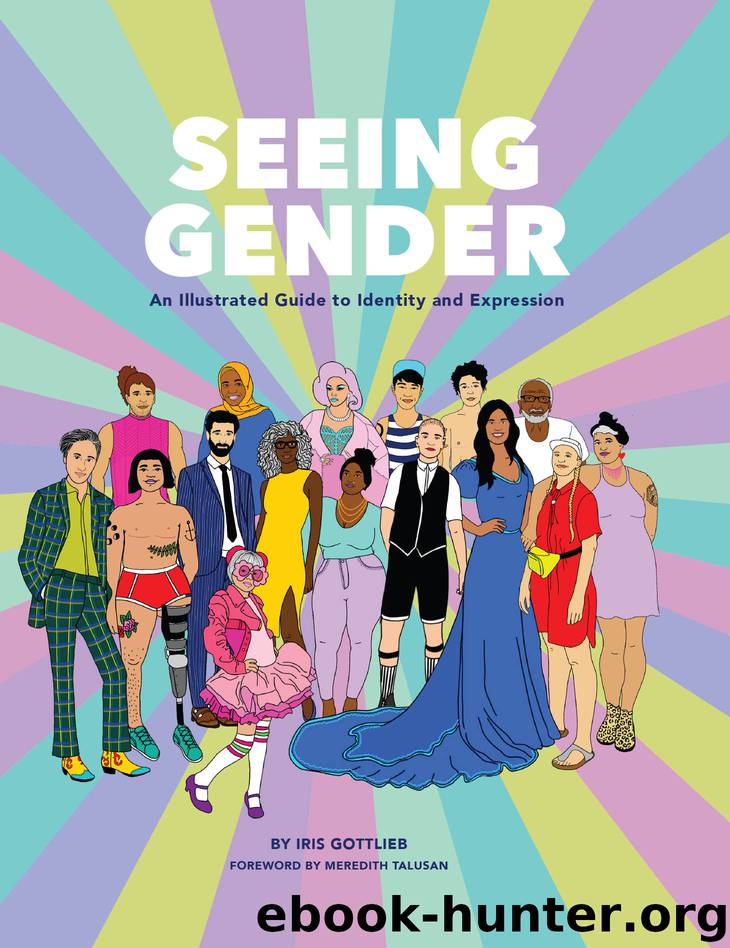Seeing Gender: An Illustrated Guide to Identity and Expression by Iris Gottlieb

Author:Iris Gottlieb [Gottlieb, Iris]
Language: eng
Format: epub
Tags: Non-Fiction, Lgbt, Glbt, Queer, Gender, Sexuality
ISBN: 9781452176666
Publisher: Chronicle Books LLC
Published: 2019-10-21T13:00:00+00:00
These portrayals are an inaccurate and incomplete depiction of people’s struggles with eating disorders.
Men, people of color and queer, transgender, and elderly people are just as affected by eating disorders (if not more). The mental, emotional, and physical reasons behind eating disorders can vary widely from person to person, many of which we don’t think about in our usual discussions surrounding eating issues. Here are some of the reasons why someone could develop an eating disorder:
Men who feel pressure to be more masculine/ have a more muscular body can develop addictive behavior around exercise and severely restrict or alter their food intake.
Genderqueer or transgender people who don’t feel comfortable in their bodies but who aren’t able or wanting to surgically change their bodies feel they can have some level of control with food or extreme exercise.
Women who have experienced sexual assault might overeat to dissociate from trauma, make themselves feel more protected from the threat of male violence, or reduce unsolicited male attention. (Fat phobia is very directly correlated to more or less weight being deemed attractive.)
People who have mental illnesses such as anxiety, depression, borderline personality disorder, bipolar disorder, PTSD, and OCD might be more likely to develop an eating disorder.
Elderly people are assumed to not be as sexual or desirable as they once were, stoking self-doubt and putting huge pressure on feeling attractive and confident. One does not grow out of mental illness just because of age, and the elderly often lose consistent support networks over time.
In certain cultures where it is rude to turn down offerings of food, one may purge in secret or restrict when alone.
Children raised around diet culture or explicit beauty standards (such as parents with eating disorders or interest in child beauty pageants) absorb that as normal behavior for adults.
People—particularly women of color—see only thin white women being upheld as the model for beauty standards.
Children raised in homes where food was scarce adapt a scarcity mentality.
Eating disorders are often genetic.
Download
This site does not store any files on its server. We only index and link to content provided by other sites. Please contact the content providers to delete copyright contents if any and email us, we'll remove relevant links or contents immediately.
| African-American Studies | Asian American Studies |
| Disabled | Ethnic Studies |
| Hispanic American Studies | LGBT |
| Minority Studies | Native American Studies |
Cecilia; Or, Memoirs of an Heiress — Volume 1 by Fanny Burney(31447)
Cecilia; Or, Memoirs of an Heiress — Volume 3 by Fanny Burney(31037)
Cecilia; Or, Memoirs of an Heiress — Volume 2 by Fanny Burney(30985)
The Great Music City by Andrea Baker(23001)
We're Going to Need More Wine by Gabrielle Union(18126)
Bombshells: Glamour Girls of a Lifetime by Sullivan Steve(13158)
Pimp by Iceberg Slim(13000)
All the Missing Girls by Megan Miranda(12838)
Fifty Shades Freed by E L James(12492)
Talking to Strangers by Malcolm Gladwell(11991)
Norse Mythology by Gaiman Neil(11962)
Crazy Rich Asians by Kevin Kwan(8412)
Mindhunter: Inside the FBI's Elite Serial Crime Unit by John E. Douglas & Mark Olshaker(7898)
The Lost Art of Listening by Michael P. Nichols(6534)
Enlightenment Now: The Case for Reason, Science, Humanism, and Progress by Steven Pinker(6449)
Bad Blood by John Carreyrou(5816)
The Four Agreements by Don Miguel Ruiz(5577)
Weapons of Math Destruction by Cathy O'Neil(5096)
We Need to Talk by Celeste Headlee(4920)
